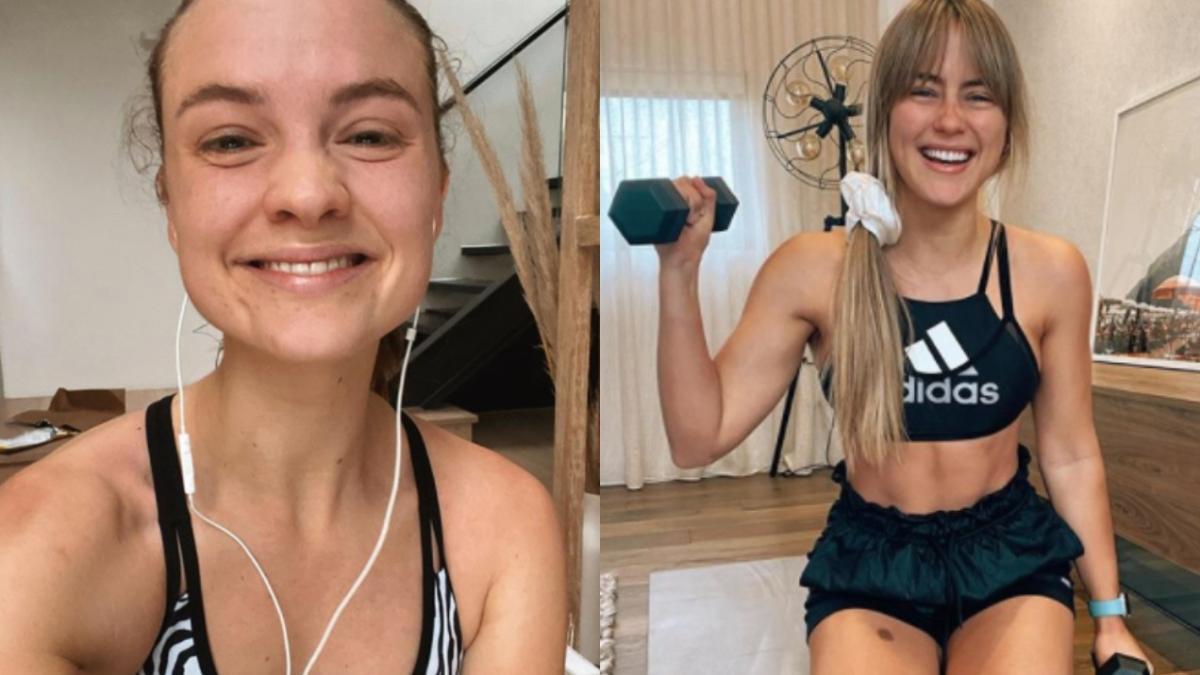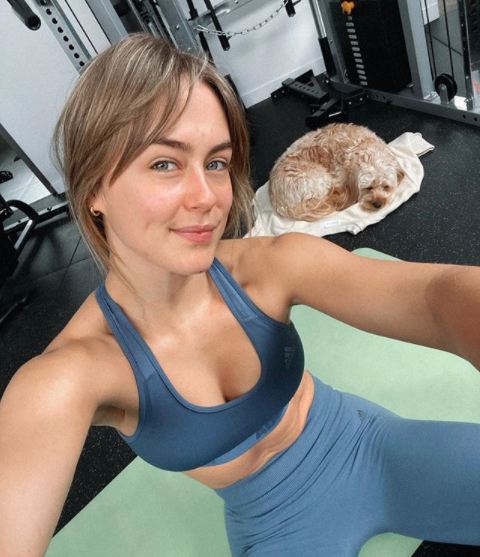
Steph Claire Smith and Laura Henshaw – a.k.a. the Keep It Cleaner fitness queens – have given us a look into the strategies they’re using to cope during Melbourne’s Stage 4 lockdowns.
Since the start of the pandemic, these two have been working to keep everyone’s spirits up. Whether it was hosting free online workouts, reminding everyone that lockdown weight changes are incredibly normal, or even just talking about the bad days as well as the good, it’s fair to say that Steph and Laura have been an example of how influencers should be posting through a pandemic.
But, they’re still in lockdown. And while that’s harder for some people in Victoria than others, it’s not particularly easy for anyone.
“There’s so many people worse off, so for a while I didn’t let myself feel sad,” Laura told PEDESTRIAN.TV.
“It’s been tough on everyone. The uncertainty of 2020 has definitely impacted my state of mind.
“I have a Type A personality, and when I can’t control things, it can be really stressful. You want to feel like you’re doing the right thing, but in this case the right thing is staying home and not really doing much. That’s been really tough. I have anxiety, and if you’re an anxious person you’re an over-thinker. To be honest with you, I’m just sick of my thoughts.”
In (seperate) conversations, both she and Steph stressed about how grateful they were to be able to continue working, but it doesn’t mean things haven’t begun to feel a bit… flat.
“Like anyone that might have struggled with their mental health in the past, 2020 has hit me harder,” Steph said.
It’s why the fitness duo decided to host a virtual 5km ‘fun run’ via their KIC app, with the intention of raising money for R U OK. For every person who took part, KIC was going to donate $50 to the charity. They managed to raise a bonkers $20,000.
“We just thought it was a really great way the community could connect with one another, encourage each other to get moving, and just have a nice, feel-good day,” Steph said, pointing to the fact that heaps of people start exercising with the goal of improving their mental health. “We were stoked we raised $20k.”
Both women are pretty open about their mental health and challenges; for Steph, mental health only became an issue when she hit her 20s and began modelling.
“I had a really great childhood,” Steph said. “I was a really happy kid and even in my teens, I never struggled too much. But it was when I first started modelling and went overseas and had this whole journey with body image and an unhealthy relationship with food and exercise was when I first started experiencing mental health challenges.”
It’s no surprise that both women point to exercise and good nutrition as being key to managing their mental health – it’s why they started KIC in the first place – but it’s obviously not the only one. So, we asked them: how are they actually managing their mental health right now?
1. Let’s get this out of the way – exercise.
Okay, of COURSE we were going to talk about exercise. There’s no way you can interview people like Steph and Laura and they won’t tell you that moving is how they keep on top of their mental health.
The good news is: it doesn’t have to be an intense workout.
“When I’m having an overly stressful day, I’ve actually realised that tuning into a softer kind of exercise, whether it be pilates or yoga or even just going for a walk with my dog, that has been amazing for me,” Steph said.

For Laura, being in nature for the government-mandated two hours per day is also a big part of it.
“Running for me is a huge form of meditation,” she said. “It’s an amazing way to get outside and connect with nature.”
2. Finding the balance
For Steph, one of her biggest drivers of good mental health is keeping her work, family, friends, exercise and rest in as much balance as possible.
“I know there’s not a perfect balance, but to me having some sort of a balance in my life when it comes to work pleasure and you know, health like exercise and eating well, kind of when I feel my best,” she said.
Look, finding ‘balance’ is the easiest thing to goal set for and the hardest thing to achieve, but those moments when you feel like it’s all in play? Perfection.
3. Therapy
If we’re going to talk about mental health, it was important to me that we broach the subject of therapy. For something that is so helpful in managing mental health, there’s still a reluctance to talk about seeing a psychologist openly.
Luckily, both Steph and Laura were happy to chat about their own experiences. Steph said she managed to see a psych before Stage 4 really hit, when she got to a point where she couldn’t manage her stress levels at home, or find any space between home life and work life.
“It was something I’d thought about doing in the past, but I’m sure, like everyone, you kind of go through a period where you become you become okay and then you think, ‘Oh, maybe I’ve got through it, maybe I’ve worked this thing out on my own, and I don’t need to go anymore’,” she said.
“You somehow choke yourself out of it. And then when COVID hit, and things were worse than ever in my own mental state, I was like, ‘You know what? I’m just going to give someone a call and, and finally, kind of rip the band aid off’.”
Laura is still in that ripping-off stage.
“I’m embarrassed to say I haven’t seen one,” she said.
“I had an appointment booked in – that was a really big thing for me to do – and then lockdown hit.”
She said she wants her first appointment to be face-to-face, so is planning to try again once Melbourne’s restrictions ease up. However, the wait hasn’t helped her anxiety about seeing a psych in the first place.
“I like to fully prepare for everything that I do,” Laura said, “so I had this feeling that if I was going to book in, then I’d have to have this report on my life ready. And that’s not the case of all.”
It’s important to note here that therapy isn’t as easy for everyone, particularly in Melbourne. While Medicare does rebate 10 therapy sessions per year (with an additional 10 sessions for everyone subject to further restrictions), most often this doesn’t cover the full cost. And then when you factor in things like finding a therapist you like, managing to get an appointment during this busy time, and doing it all via TeleHealth depending on where you’re located, it can be a bit tough.
4. Listening to podcasts
Laura said one of the things helping her cope right now is chucking on an uplifting podcast and going for a long walk. (Yes, I know we covered exercise in tip #1, but podcasts are a whole new element here!)
Her recommendations? Shameless and Oprah Winfrey’s SuperSoul Conversations. Good company tbh.
5. Meditation (even if you think you’re a person who can’t meditate)
Meditation is one of those things we all know is vaguely ‘good’, but can be intimidating as hell to get into. Just ask Steph.
“I used to be quite a fidgeter,” she said. “And I never ever thought I would say this, but I do love a good guided meditation.”
Two years ago, she says she would have balked at the idea of sitting in silence for extended periods of time.
“But I think with the guided meditations we have on the app [the KIC wellness app], because it’s almost like a story, you just start listening to the coach and you kind of get lost in it,” Steph said.
“And now I use them to fall asleep, or get out of my head, or just to breathe. I think if anyone has been thinking about giving meditation a go, try something like a guided meditation. You don’t just have to sit there in silence.”



